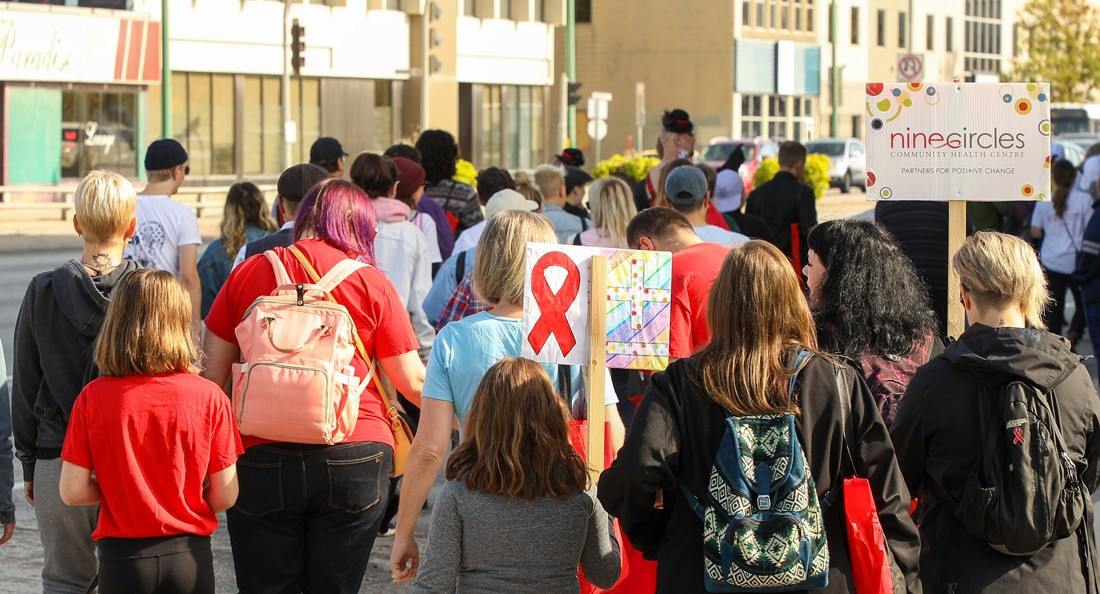Running for awareness and community
Nine Circles speaks out about the state of HIV in Manitoba
On Sept. 22, the Red Ribbon Walk and Run was held in Vimy Ridge Park. The event brings awareness to the state of HIV in Manitoba, provides community space for those with HIV and raises money for the programs and services provided by Nine Circles Community Health Centre.
Michael Payne, executive director of Nine Circles, says his team “still (finds) that people in Manitoba are struggling with an understanding of HIV: both an understanding of transmission, and also a lot of stigma and fear associated with HIV because of that lack of knowledge.”
Nine Circles is a health centre for people living with HIV, hepatitis C and other sexually transmitted infections, as well as a community partner site for the Manitoba HIV Program, which also includes the Health Sciences Centre and Seventh Street Access in Brandon. The program just released their report for 2018.
Payne says there are a lot of things about the current state of HIV in Manitoba that might surprise people. Most of the people diagnosed are heterosexual, and, in the past year, 34 per cent of new infections came from injection drug use rather than sexual contact.
He says this is because of the prevalence of crystal meth use in Manitoba, and that services like safe injection sites should be more seriously considered as a way to reduce new infections.
Payne also says there are a number of factors that make HIV in Manitoba different from cases in other provinces. Aside from details about the state of the virus (Manitoba is one of two provinces where there are more new infections among women than men), “In most parts of the country, HIV treatment is free, but it isn’t free here in Manitoba.”
Free access to HIV treatment can lead to an “undetectable load,” when there is so little HIV in the blood that it becomes hard to detect and hard to pass to another person. Payne says that this has been quite successful in other provinces, often in combination with free Pre-Exposure Prophylaxis (PrEP), medication that people who are at a higher risk of exposure can take.
Dr. Dick Smith is a now-retired doctor whose work involved pioneering treatment and advocacy for people with HIV and AIDS. Now a spokesperson for Our Own Health Centre, a clinic which serves “the community of gay, bisexual and other men who have sex with men,” Smith says that because the federal government recently approved the use of Dovato (a new form of single-pill therapy), care could become much more manageable with fewer side effects than the common multiple-pill treatments.
The Manitoba HIV Program’s 2018 report also emphasizes the role of systemic racism in HIV rates and care for Indigenous people.
“Health-care leaders must address barriers faced by Indigenous people that result in avoidable and unfair inequities when accessing care,” the report says.
“Systemic racism related to HIV includes (a) lack of HIV awareness campaigns for Indigenous Manitobans, inequitable access to culturally safe testing and treatment and lack of public information available about Pre-Exposure Prophylaxis (PrEP) being available free of charge for people covered under the Non-Insured Health Benefit.”
Aside from the cost of medication, Payne hopes to see better access to care outside of Winnipeg and Brandon.
“We would love to see a clear plan for not only increasing HIV testing but also a solid plan for linkage to care in every region of the province,” he says. Payne is hoping to see a provincial plan come out in the next year.
Dr. Smith says while Our Own Health Centre has been interested in becoming a part of the program, it does not seem to currently be feasible.
He says that the program would benefit from doing more clinical outreach to organizations and health clinics willing to host.
“It continues to be a big problem for people disclosing they have HIV or being afraid to get tested, because if they have HIV, then there’s the stigma attached to it,” he says.
Published in Volume 74, Number 4 of The Uniter (September 26, 2019)







